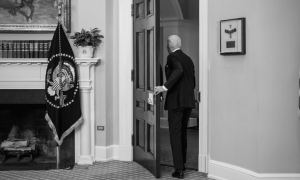His demeanor was kind, his intentions sincere, yet the weight of age bore heavily upon him. He appeared clouded, his recollection faltered, and as the purported leader of the Free World, he seemed on the precipice of retirement. Such is the implicit narrative gleaned from the Special Counsel’s investigation into President Joe Biden’s handling of classified documents during his tenure as vice president in the Obama administration.

The report by Special Counsel Robert Hur did not carry punitive measures, but its critique cut deep. It resembled more of an evaluation by a caregiver assessing the need for enhanced care for an individual in their twilight years. Throughout the inquiry, there was no improvement in Biden’s condition. His memory, in fact, seemed to deteriorate further. During interviews, he struggled to recall key details such as the tenure of his vice presidency, displaying forgetfulness regarding both the start and end dates.
In a tense press briefing, Biden vehemently defended the state of his memory, dismissing inquiries about his recollection of personal tragedies and asserting his competence. Yet, the troubling portrait painted by the investigation raises questions about his suitability for office. Even before assuming the presidency, Biden’s political career was marred by a litany of blunders, from plagiarism scandals to embellishments of his academic achievements.
During his 2020 campaign, Biden’s team sought to shield him from potential verbal missteps, exacerbated by the isolating effects of the pandemic. However, his tenure as commander-in-chief has only exacerbated concerns. From inaccuracies in COVID-19 death toll figures to misidentifying world leaders, Biden’s lapses in memory and judgment have become increasingly apparent.
While some mishaps may elicit amusement, such as his confusion between historical events and sports teams during a visit to Ireland, the more pressing issue lies in the potential ramifications of a declining memory on policymaking. Biden’s stance on critical matters, like the Taiwan question, risks being influenced by his failing memory, leading to erratic decision-making and policy shifts.
In contrast, Biden’s political opponent, Donald Trump, though also advanced in age, exhibits a different demeanor. Trump’s penchant for bluster and deception often blurs the line between deliberate manipulation and genuine confusion. Despite his own memory lapses, Trump maintains a fervent base that forgives his missteps and reinforces his image of perpetual youth.
As the specter of age-related decline looms over Biden’s presidency, his team may need to adopt measures to shield him from scrutiny and mitigate potential risks. However, the challenges posed by cognitive decline extend beyond individual leaders, prompting broader discussions about the impact of aging on governance and national security. As the 2024 campaign approaches, the issue of Biden’s cognitive fitness is likely to take center stage, shaping the contours of political discourse and public perception.

